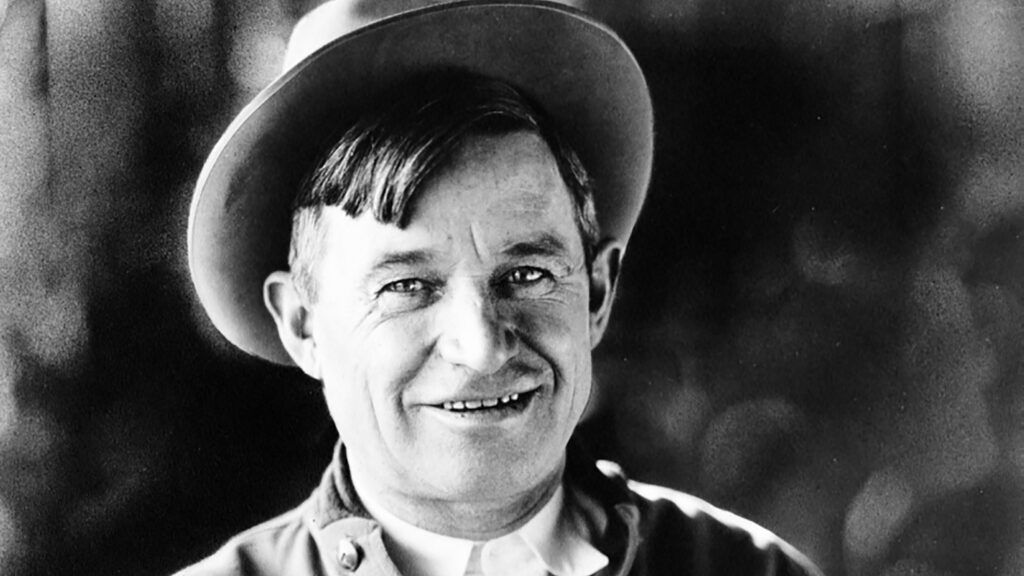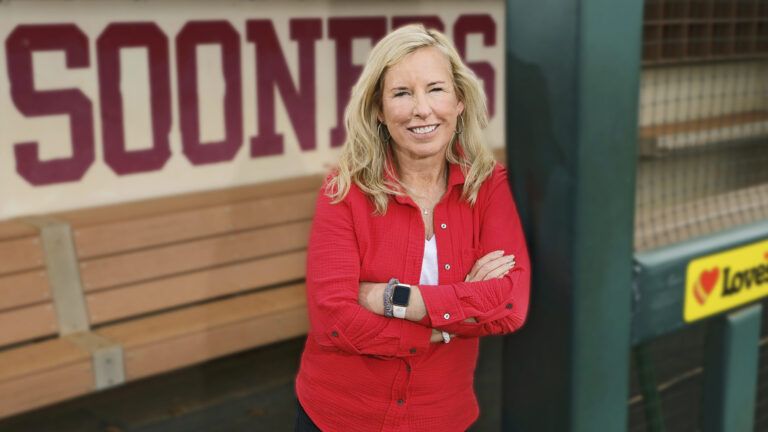“Live in such a way that you would not be ashamed to sell your parrot to the town gossip,” my father once said.
If Will Rogers had a rule to live by, maybe that’s the one. Anyway, it’s one I remember best.
Many of his words are still repeated often. However, his heritage to his children wasn’t words, or possessions, but an unspoken treasure, the treasure of his example as a man and a father.
More than anything I have, I’m trying to pass that on to my children. I would like the treasure of my father’s past and the best of my present to merge with their future.
The spiritual heritage we get from our parents isn’t easy to pass on to our children, but I shall never cease trying.
I remember my father with reverence and laughter. To many he was the Oklahoma cowboy, with a hair lick over his forehead, an infectious grin, twirling a long lariat, and speaking a language of his own that bit big hunks into the sham of his day.
He’s thought of as a humorist. He was, but he was more, too. He was never an actor, though his name blazed in lights from Hollywood and Broadway to Berlin and Alaska. He was always himself.
Even as a wit he was trying to express ideas and ideals, and he would have preferred approval for them rather than applause for his humor.
I do not remember receiving very much lecturing from him at any time. He gave my sister Mary, my brother Jim, and me a good moral tone with the quiet sincerity which was always evident in all he said and did.
When I was a kid I wanted a motor to attach to my bike. I wanted it badly, maybe because none of the other kids had one. But it was very expensive and when I asked my father for it he said no.
“But Dad, we’re rich,” I protested.
Well, the whole roof descended on me. He said no kid of his was ever going to parade any advantage he might have, and I’d better unlearn any such notion at once. Then he muttered something about show-offs, the poor show-off who is always lonely because he’s always empty.
That made a big impression on me. Not so much the event, but the meaning my father gave it. Undue emphasis on material things made possessions ends in themselves, and that was morally wrong, if not destructive.
Growing up with that idea can make Christian ethics a habit, though at the time we didn’t think of it that way, and my father didn’t put it to us that way. The example is always more effective than the sermon. And he often put his ideas to us with a kind of barbed laughter.
When any of us felt important or inflated with our knowledge, we had only to remember his remark:
“Everybody is ignorant, only on different subjects.”
Once, while in high school, I rushed home all excited because I’d been picked to recite a long, humorous poem. I had to try it out right away. My father retreated behind his newspaper, so I made Mother listen. Half way through I fumbled, faltered, and came to a helpless halt.
Father, who I thought was paying no attention at all, came out from behind his paper and finished the whole poem. He also knew the author and when it was written. Then he went back behind his paper. I never recovered my conceit.
He was always the example. In those days parents assumed an automatic leadership I don’t see in parents today, including myself.
My father was the head of the house. He behaved as the head of the house. He was the parent, kindly, generous, but definite. When he said it should be done, it was done. That fashioned us when we were young.
Sunday school for us was like going to regular school. We just went. And we were taught the reality of prayer at home. When I was about nine my father got sick. In the hushed house, my mother told us about the time all her children were sick with diphtheria.
That was before I could remember. I had another brother then, Fred, who died of diphtheria; Mary and Jim and I almost did.
“But your father was down on his knees praying for all of you,” Mother said. “Now let’s kneel and pray for him.”
We did.
He taught us to ride and rope out on a polo field near our house. I couldn’t get third money in a rodeo with my rope, but I liked riding and polo, and went to the University of Arizona so I could play it.
Well, I played it all right, and got to drinking and almost flunked out. I felt pretty miserable after that first term, and pretty ashamed. My father didn’t bawl me out or cut off my allowance or anything like that. He had a better lever.
It’s a palpable fact that every son wants his father’s respect, and at this point I wanted his desperately. His disapproving silence was like a lash. Once in a while at the table he’d mention some of the wastrels, handy examples in those days, who rode around in their cars doing nothing.
The only way I could win his respect again was to switch to another university and do better.
The next term I went to Stanford, and majored in philosophy. I took two courses in comparative religion, among other things, studied hard and figured I had it all solved. One day I told my father:
“That old Greek, Socrates, put it all in two simple words: ‘Know thyself.’ “
“Yep, and then get to know the other fellow, too,” my father said. “There’s always two halves to a whole.”
That was pretty good for a cowboy who never got beyond the fourth grade.
He was always suspicious of any one with a pat and absolute answer to every problem. He believed in man’s failure as well as his glory, and was willing to accept both, because with his compassion he knew all of us take two steps backwards before we move one step forward.
My father’s family were Methodists and Baptists, and I remember the giggling among us kids because his sister, Aunt Sally, said it was improper to dance. Well, times change and now most ministers think dancing is all right, and there’s a lesson there:
“The basic ideas of faith do not change,” my father said, “but how you adapt those ideas to a changing world is the important thing, and will determine the durability of your faith.”
My wife, Collier, and I have three sons: Randy is 18 and at Cedar City University in Utah. Clem is 17 and Carl is only five. They’re good kids and developing into fine young men.
They are all adopted children, and from the very first I have always talked to them as adults. I tried to expose them to some of the ideas I picked up at Stanford. They were bored.
So I try to use my father’s approach. I want them to speak from the strength and security of conviction. Maybe that comes with age; it did with me, only I’d like my sons to get it a little earlier.
Randy was once in a car wreck. His car and the other one were coming around a curve, and both skidded off the road and hit each other. No one was hurt. Randy phoned all excited, and to hear him tell it, it was all the other fellow’s fault.
“Were you really going slow?” I asked.
“Well, not too slow,” he hemmed.
“How slow? 60?”
“Not 60! Honest, Dad. It wasn’t 60—maybe 50—55, but not 60!”
He was driving in a 40-mile zone. But he told the truth, and he learned a lesson about speeding. We all know we have to believe each other the rest of our lives, and the truth is more important than the deed. He knows it, they all know it.
Once a year the boys make up a list of food and send it to a Navajo family of 20 people. They’ve always had a sense of responsibility for this family. When a member of that family bought a wagon, a necessity on the reservation, the boys saw that it was properly outfitted.
To me things like goodness, honesty, charity are absolute truths. They have intrinsic value in themselves. Live by them and you will live a happier, better life.
My father gave me the notion that it’s nice to believe in God because it will tend to make you honest, but it’s more important to believe in God because a symbol bigger than yourself is essential to morality. Otherwise everything is as small, limited and fallible as you are.
The boys get that idea.
God’s existence, I tell them, is above and beyond us. It s a spiritual matter that can’t be measured by any tape or microscope.
We are given a mind by God, and that mind makes moral judgments. Only the belief that you are good, or capable of it, that your fellow man and all creatures are good, only that concept can bring you happiness. The more you practice it the better you will be.
My father lived that concept.
“And that concept is God,” I tell my sons, “or one facet of Him anyway. But it’s big enough to keep you busy for an awful long time.”
We’re all busy at it.
For more inspiring stories, subscribe to Guideposts magazine.






